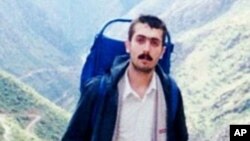Habibollah Latifi is an Iranian student of Kurdish descent who has been sentenced to death in Iran after being found guilty of crimes against national security, including what the Iranian government calls "waging war against God."
Arrested in 2007 after participating in anti-government protests at Azad University, Mr. Latifi was scheduled to be hanged on December 26, 2010. Human Rights Watch and Amnesty International say that his conviction and sentence followed both an unfair trial and allegations of torture.
Iranian authorities suspended his execution after international human rights monitors expressed grave concern about his case, and a crowd, reportedly as many as three hundred people, gathered outside Sanandaj prison on December 26th to protest the impending execution. After it was suspended, Mr. Latifi's family was allowed to visit him briefly; but later that evening, in an ominous move, several members of his family were themselves arrested.
Human Rights Watch reports that Mr. Latifi is one of at least 16 Kurdish Iranians who face execution on various national security-related charges. In a report published in 2010 and cited by the U.S. State Department in its own human rights report on Iran, Human Rights Watch documented government persecution of the 4.5 million Kurds in the country.
According to the report, Iranian authorities used the government's security laws, media laws, and other legislation to arrest and persecute Kurds solely for exercising their right to freedom of expression and association. The government has banned Kurdish-language newspapers, journals and books, and punished publishers, journalists, and writers for opposing and criticizing government policies. Authorities also have suppressed legitimate activities of Kurdish NGOs by denying registration permits or bringing spurious charges of security offenses against individuals working with such organizations. In the light of such repression, the plight of Mr. Latifi-- and now his family – deserves international scrutiny.
Last month the United Nations General Assembly adopted a resolution expressing deep concern "at the ongoing systemic violations of human rights" of the Iranian people, citing, among other provisions, "increasing discrimination and other human rights violations" against Iran's religious and ethnic minorities, including its Kurdish population.
The United States welcomed the resolution and continues to urge the Iranian government to fully respect the human rights and fundamental freedoms of all Iranian citizens.
Habibollah Latifi is an Iranian student of Kurdish descent who has been sentenced to death in Iran after being found guilty of crimes against national security, including what the Iranian government calls "waging war against God."




